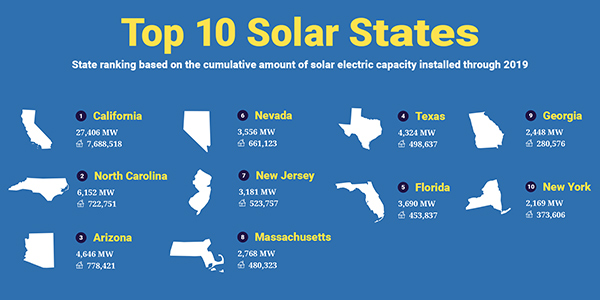The New Jersey Board of Public Utilities acted Monday to help solar project developers who face a looming registration deadline at the end of the month despite continued interruptions from the COVID-19 pandemic.
The BPU unanimously passed special procedures for registrants in the Solar Renewable Energy Certificate (SREC) program who would have completed all necessary steps to secure eligibility by April 30 but were prevented by the pandemic from obtaining municipal code inspections or permission to operate from their electric distribution companies.
The board announced April 6 that it was directing its staff to close the SREC program by the end of the month because it was about to achieve a Clean Energy Act of 2018 (AB-3723) requirement that it be ended when 5.1% of electricity sold in the state was generated by solar. (See Solar Subsidy Program Ending in New Jersey.)
The BPU established the SREC program in 2004 to complement the state’s existing solar rebate program. The program helped the state become one of the leading solar energy producers in the country.
BPU President Joseph L. Fiordaliso said the measure was “certainly appropriate” in light of the emergency. He noted that New Jersey utilities have been cooperative during the pandemic and toward the state’s ratepayers.
“The least we can do is to try to make some accommodations in order to relieve some of the pressure and stress that some of these developers have been experiencing,” Fiordaliso said. “I believe that this action will certainly do that.”
Scott Hunter, manager of the BPU’s Office of Clean Energy, presented the rule waiver to the board, saying the measures were necessary to give the SREC administrator flexibility in determining when projects have commenced commercial operations to qualify for the program.
The waiver extends the due date of finalized SREC paperwork to 90 days from the date when New Jersey’s emergency declaration is rescinded. Hunter said eligibility is limited to projects that are currently enrolled in the program and have been kept them from receiving final approval from local inspectors because of the pandemic.
“We’ve heard anecdotes from solar developers and the electric distribution companies [EDCs] through connections to staff representatives of local municipal inspection processes slowing down,” Hunter said. “And since municipal compliance is a prerequisite to EDCs granting permission to operate, the result has presented a barrier for some projects to achieve their commencement of commercial operations despite being mechanically complete.”
The new process creates a procedure to show the SREC projects were mechanically complete by April 30. Hunter highlighted six requirements:
- An affidavit from the project owner that the failure to obtain permission to operate was because of pandemic-related closures of local government offices or delays in the issuance of permission to operate from the EDC.
- An affidavit signed by a person with direct personal knowledge of the solar project stating the project was complete except for final inspections or final permission to connect to the grid prior to April 30.
- Date-stamped pictures of the array, inverter and balance of system.
- Date-stamped evidence that project representatives attempted to communicate with local code officials, including emails requesting an inspection, or communication with the EDC to connect if the project had already been inspected.
- A milestone report form that reflects the status of the project, including request dates for inspection or an application to connect to the grid.
- Any other evidence BPU staff or the SREC administrator may request.
Replacement Solar Program
The board also unanimously voted to consider amendments to the proposed renewable portfolio standard rules approved at its March 27 meeting and create new rules establishing the solar Transition Incentive Program.
The BPU is replacing the SREC program in two phases, beginning with the Transition Incentive Program, designed to serve as a bridge between the SREC and a yet-to-be determined successor program. The board is issuing fixed-price, 15-year Transition Renewable Energy Certificates (TRECs) to projects that entered the SREC pipeline after Oct. 29, 2018, but had not reached commercial operation as of April 30.
SREC Program Administrator Ariane Benrey said that following the board’s vote, staff posted an advance copy of the proposal to the BPU website, which received questions and comments from stakeholders.
Staff proposed approving a new version of the proposal that includes modifications intended to clarify certain elements of the transition program related to the length of time and process for project registration, Benrey said.
The rule proposal will now move to the Office of Administrative Law, Benrey said, where it will be open to public comment for 60 days before returning for final board approval.
“Staff continues to learn from the implementation of the Transition Incentive Program prior to the close of the SREC registration program on April 30,” Benrey said.
Stakeholders said after the meeting that the amendments were a positive step in keeping solar projects thriving in New Jersey. Solar advocates also pointed out the new program needs improvements.
“The transition program will allow some solar to move forward, but we need a long-term solution,” said Jeff Tittel, director of the New Jersey Sierra Club. “We need to move quickly to develop a new program and come up with a new funding mechanism so that the solar program can come back.”






